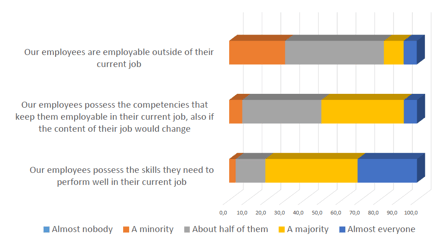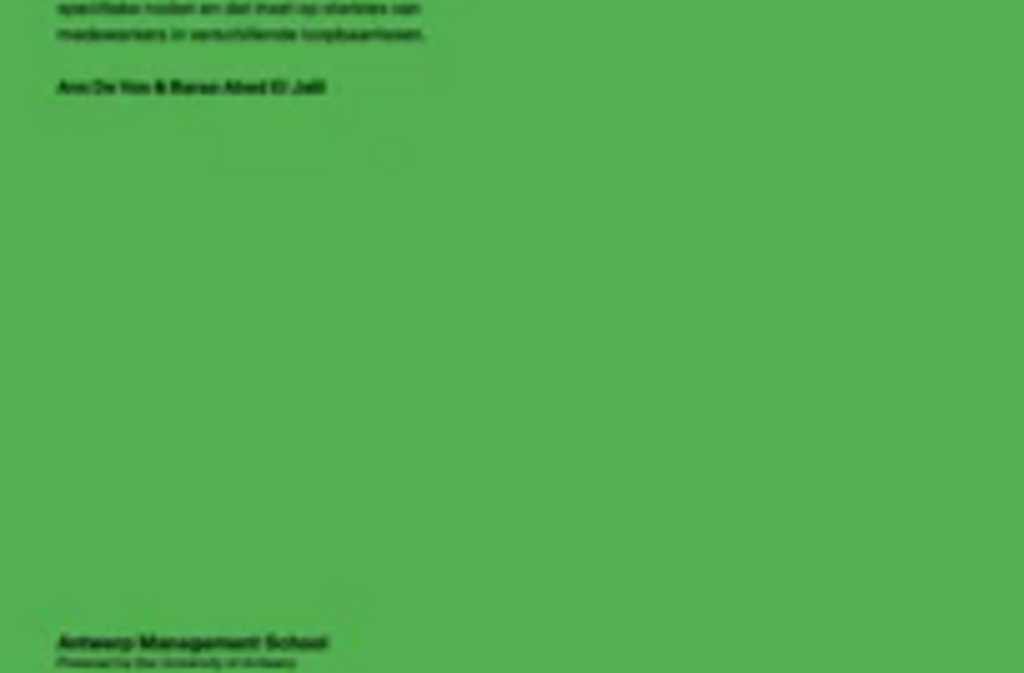Six conditions for a more flexible talent policy
1. The adaptive capability of talent management
At school our children learn-even more than we do- things they won't need later. Adaptability has become a real buzzword and that makes sense, but it's also dangerous. Ans: "It's no longer about finding the perfect match between a person and a job. It's about dealing with constant change. The question is: how do you make sure that in your talent management you don't focus too much on predicting something that can't be predicted?"
It's not just about finding talent to match those - sometimes unpredictable - changes of the coming years. It's also about helping that talent develop. "Don't lose sight of the day-to-day realities of your organization and make sure talent wants to continue to adapt."
2. Talent is everywhere
Talent is not only found in the core of a company. Companies are increasingly using freelancers. So talent doesn't only have to be on payroll; we need to move to an "agile HR system. "Sometimes crucial talent comes from outside, in development teams, for example. Apple brings in a lot of freelancers who do the most creative part of the design of, say, a new iPhone."
Therefore, Ans recommends delving into the workings of agile teams, a topic Prof. Cappelli would also go on to discuss. Therein lies an opportunity to focus more on internal talent. "We are still very traditional. When we need new staff, we usually choose to recruit externally instead of allowing people to grow internally."
3. A global approach to personal talent
"Talent is much more than skills. It's also about who people are," Ans emphasizes. It's important to look at the complete person, because talent is not only about hard skills. With growing technologization and internetization, we will place more and more importance on quality human contact. Ans quotes Geoff Colvin: 'Being a great performer is becoming less about what we know and more about what we're like'.
If we look at the top 10 most in-demand skills in job postings over the past 7 years, we already see quite a few evolutions. "When it comes to valuing talent, for example, social capital will play a bigger role than human capital. It is not only about what you know and can do but also about who you are connected to and how you can connect with others. Soft skills will also come more to the forefront in job postings; it is precisely those soft skills that are harder to learn." Not only is "who you are" more important than "what you know," the quality of your network is also relevant in demonstrating "who you will become.
4. Talent is the new currency
After studying more than 4.5 million job ads published in Flanders between 2010 and 2016, Ans concluded that there is a kind of inflation taking place. "Despite saying that talent is harder and harder to find, we also have higher and higher demands. Within some sectors, we saw that the demand for soft skills is rising, but that the demand for hard skills is rising even faster in the process."
So companies know increasingly well who they need, but are demanding more and more different things. And that makes talent increasingly valuable. Finding these requirements all in the same person is very difficult and thus makes talent valuable. It is looking for the holy grail who is both knowledgeable and social and has a network. There is therefore a need to organize education differently.
5. Future-proof talent
Let's not forget that it's not just about current talent. It's important to future-proof your people's talent. A survey Ans conducted with HR Square in 2018 showed that companies believe most or almost all of their employees have the competencies to do their current job well.

When asked whether their employees have the capabilities to still perform well when the current job content changes or if they were to get another job, the answers are more doubtful. Nevertheless, low talent mobility is also often seen at the same companies. "So investing in the sustainability of employees is something that many companies can learn from," he said.
6. Mobilizing talent
Furthermore, we see that people don't change jobs very often within organizations. In a recent study with SD Worx, for example, 70% of the organizations surveyed indicated that it is normal for employees to do the same job for years. How can you get people use the skills they barely need in their jobs?
Indeed, what it ultimately boils down to, is that there are many ingrained patterns to be found. "Today, we can't just be concerned with what our organizations need. We must ask ourselves how we can become organizations with unique opportunities for growth."
Wondering what the H in HRM stands for? Read the part with Prof. Dr. Peter Cappelli here.





